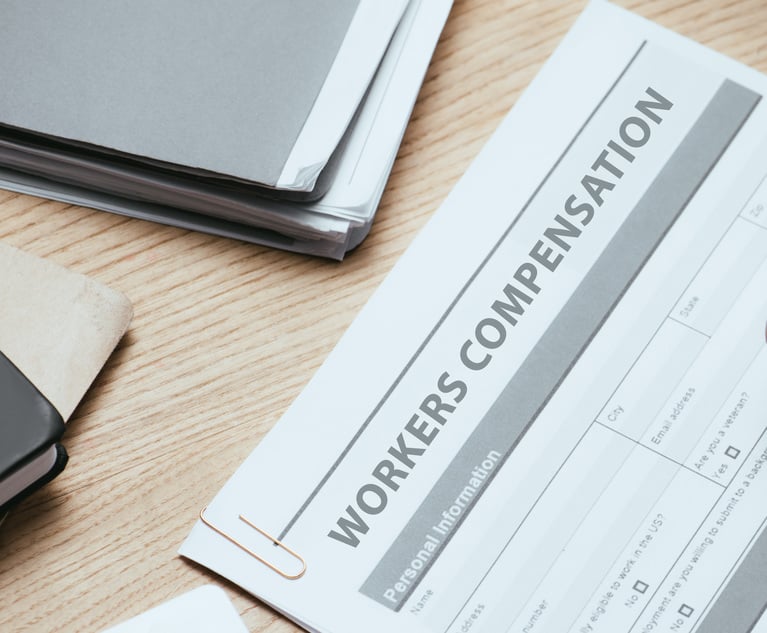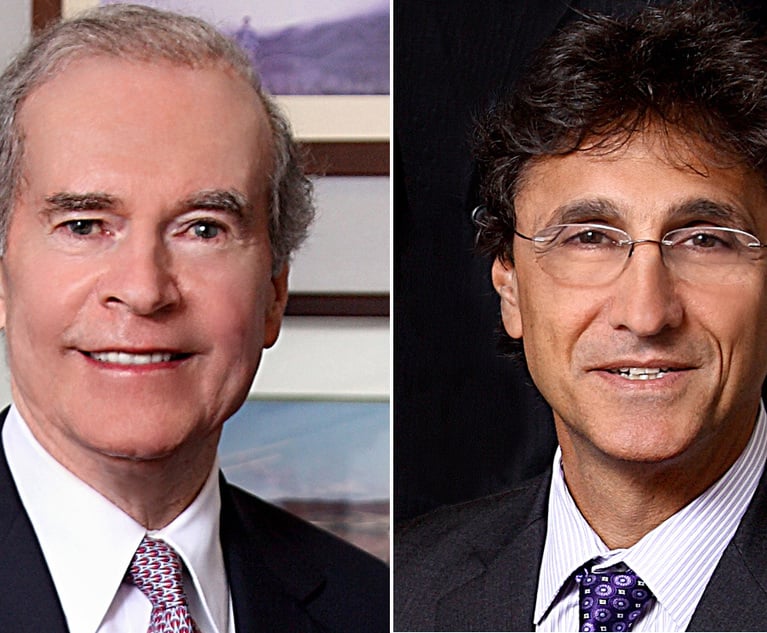Raising the Bar
By raising the bar for associate training and experience we can all raise the bar of great litigators in the next generation—lawyers we will be proud to call colleagues and partners.
May 16, 2019 at 11:00 AM
8 minute read
 As the partner responsible for my firm's recruiting and training programs, I routinely hear associates at major firms tell a story that goes something like this: “I've been here for years, but I'm still mostly doing discovery and research. I work with associates who have gone eight or nine years without going to trial, arguing a motion or appeal, or in some cases even taking a deposition. I work in litigation, but I'm not learning how to litigate.”
As the partner responsible for my firm's recruiting and training programs, I routinely hear associates at major firms tell a story that goes something like this: “I've been here for years, but I'm still mostly doing discovery and research. I work with associates who have gone eight or nine years without going to trial, arguing a motion or appeal, or in some cases even taking a deposition. I work in litigation, but I'm not learning how to litigate.”
These are not stereotypical, want-it-all-now millennials who expect instant validation (for what it's worth, I'm dubious about that stereotype, anyway). These are bright young lawyers with great credentials and strong work ethics who are not learning core litigation skills. This is not true for everyone, of course: Some associates at big firms get good litigation experience and some big-firm partners work hard to make that happen. But it is true too often for too many.
When my partners and I started Selendy & Gay last year—with over 150 years of BigLaw experience among us—we asked ourselves: Why did this happen and how can we fix it?
There are several reasons we got here. The stakes of major litigations continue to get bigger. Clients can be skittish, and partners reluctant, to give major assignments to associates in such cases. At full-service firms, some litigation partners may also feel pressure to impress the corporate partners who refer them work, fearing they may lose future referrals if they don't handle all major tasks themselves. Big firms take fewer cases to trial, producing fewer trial opportunities, while a business world awash in email and electronic documents means there is ever more discovery work for associates to sift through.
A situation in which litigation associates do lots of work but get little real experience is bad for everyone. It is bad, most obviously, for the associates, who deserve a chance to develop. It is bad for clients, who deserve deeply skilled counsel at every level—and should not have to pay more for a senior lawyer to do the work a well-trained junior attorney could do for less. And, ultimately, it is bad for big firms, which can find themselves promoting litigation partners without well-rounded litigation experience.
But those big firms may feel little pressure to change. Every year, there is a fresh crop of law school graduates, neck-deep in debt, lining up to take very well-paid associate positions. They will work, and bill, many hours. Many will leave in a few years, and there will be a new crop of graduates ready to take their place. Fairly or not, whether the firms intend it or not, many associates view this a type of cynical arbitrage.
The beauty of starting our own firm was that, after years of working for big firms, we could think about how to break this particular wheel. It makes no sense, from our perspective, to hire brilliant young lawyers just to keep them on the sidelines. Instead, we resolved that our associates learn real litigation skills, from the start. Here's what we're doing to make that vision real:
Prioritize associate experiences. Our partners deliberately look for speaking opportunities for our associates in all our cases. An associate who knows a factual or legal issue down to the ground is often the best choice to discuss it. Much more often than not, our clients agree. As a result, our associates routinely take and defend depositions, make court arguments, lead meet‑and‑confer sessions, and participate in trials, arbitrations, and hearings. Judges often complain that junior lawyers don't get meaningful speaking roles in their courtrooms—we're doing our best to make that a non-issue.
Practice apprenticeship. We don't just throw associates into the deep end of the pool and walk away; we help them prepare and execute. In the past month, for example, I second-chaired one junior associate taking her first deposition and another defending his first. In each case, the associate and I sat down and worked through the facts and strategies in detail. This type of apprenticeship, which has old roots in our profession, combines learning by doing with learning by instruction.
Make associates experts. In every case, there are critical facts and legal issues. We try to make our associates the experts on key subjects and we promote that expertise to our clients. In this way, clients develop relationships directly with associates and come to trust and rely on them. This trust makes it much easier to show a client that an associate should, say, handle an argument on a legal issue she has mastered or help examine a witness about whom he knows everything. And it can lead to associates taking on even bigger roles, even in bet-the-company cases.
Teach litigation skills that go beyond CLEs. We don't just wait for cases to present learning opportunities—we invest heavily in associate training. While we use outside presenters occasionally, our partners develop and teach the vast majority of our training courses ourselves. If this sounds like a lot of extra work, that's because it is. But our associates recognize and respond to that effort, often following up days or weeks later with questions or ideas for future sessions. Having our partners teach encourages our associates to learn.
Teach “soft” litigation skills. Litigation at the highest level requires very specialized skills, but also some basic ones: Collaboration. Communication. Time management. Giving and receiving feedback. Even so, these skills are rarely taught in law schools or at firms. We teach them. And because these are skills lawyers use almost daily, we give our associates on-demand access to a professional coach—on a confidential basis. This gives associates a private space to work through the challenges endemic in litigation—competing assignments on a deadline, conflicting comments, communicating bad news, or just plain feeling overwhelmed—but which associates too often feel they can't bring to even the most understanding of partners. Learning how to deal with these challenges early in a career, is critical foundation for a successful litigation career.
Take on pro bono work. Some firms do a lot of pro bono litigation; some do barely any; others take on primarily high-profile work. We certainly take on big pro bono matters, but we also encourage associates to take on smaller cases they can lead, including appeals and trials. This increases the chances for associates to run cases and get on their feet.
Eliminate hierarchy. Even less glamorous assignments can be valuable learning tools when associates get a holistic understanding of how cases are built. We use a “flat” staffing model in which lawyers of all levels regularly share ideas across the table, even in mega-cases or sprawling investigations. Associates learn litigation strategy directly from partners and see how their work fits into the bigger picture.
Make associates case managers. Great litigators think proactively. It can be easy for junior lawyers, especially those without prior work experience, to be reactive, dealing with assignments as they come in. To encourage proactive thinking, we make each associate serve as a case manager on at least one matter, taking responsibility for determining staffing, assignments, deadlines, and the like, and working directly with partners and support departments.
Ditch generation-based compensation. Yes, I know. This goes a smidge beyond associate training. But paying partners based on the work they bring in can have negative consequences for associate development. Rain-making partners can feel incentivized to hoard client contacts and major litigation opportunities, leaving fewer chances for associates to bring work to the table. We've ditched that model. In our team-based approach, partners are encouraged to share opportunities, not sit on them, and to promote our associates, not just ourselves.
Steps like these help to update the basic deal between firm and associate. Too often, that deal is: You will work hard, and we will pay you well. We don't think that's enough, and many associates feel the same. The deal should be: You will invest in us, and we will invest in you. We will give you serious training and meaningful opportunities (plus a nice paycheck). You will work hard and learn deeply, and, as a result, you will develop skills that will last your entire career. Whether you continue with the firm or take a different path, you will be a better lawyer for having been an associate with us.
We recognize that not every junior lawyer wants to put in this kind of work, and not every firm wants to invest its resources or its partners' time in providing this type of support. But we believe this approach will produce not only technically proficient lawyers, but well-rounded litigators who are excited about their careers. And we hope other firms will find ways—using these strategies or others—to pursue the same goal. By raising the bar for associate training and experience we can all raise the bar of great litigators in the next generation—lawyers we will be proud to call colleagues and partners.
Andrew R. Dunlap is a founding partner of Selendy & Gay and heads the firm's recruiting and training programs.
This content has been archived. It is available through our partners, LexisNexis® and Bloomberg Law.
To view this content, please continue to their sites.
Not a Lexis Subscriber?
Subscribe Now
Not a Bloomberg Law Subscriber?
Subscribe Now
NOT FOR REPRINT
© 2025 ALM Global, LLC, All Rights Reserved. Request academic re-use from www.copyright.com. All other uses, submit a request to [email protected]. For more information visit Asset & Logo Licensing.
You Might Like
View All

New York State Authorizes Stand-Alone Business Interruption Insurance Policies
6 minute read
Rejuvenation of a Sharp Employer Non-Compete Tool: Delaware Supreme Court Reinvigorates the Employee Choice Doctrine
8 minute read
Trending Stories
- 1ACC CLO Survey Waves Warning Flags for Boards
- 2States Accuse Trump of Thwarting Court's Funding Restoration Order
- 3Microsoft Becomes Latest Tech Company to Face Claims of Stealing Marketing Commissions From Influencers
- 4Coral Gables Attorney Busted for Stalking Lawyer
- 5Trump's DOJ Delays Releasing Jan. 6 FBI Agents List Under Consent Order
Who Got The Work
J. Brugh Lower of Gibbons has entered an appearance for industrial equipment supplier Devco Corporation in a pending trademark infringement lawsuit. The suit, accusing the defendant of selling knock-off Graco products, was filed Dec. 18 in New Jersey District Court by Rivkin Radler on behalf of Graco Inc. and Graco Minnesota. The case, assigned to U.S. District Judge Zahid N. Quraishi, is 3:24-cv-11294, Graco Inc. et al v. Devco Corporation.
Who Got The Work
Rebecca Maller-Stein and Kent A. Yalowitz of Arnold & Porter Kaye Scholer have entered their appearances for Hanaco Venture Capital and its executives, Lior Prosor and David Frankel, in a pending securities lawsuit. The action, filed on Dec. 24 in New York Southern District Court by Zell, Aron & Co. on behalf of Goldeneye Advisors, accuses the defendants of negligently and fraudulently managing the plaintiff's $1 million investment. The case, assigned to U.S. District Judge Vernon S. Broderick, is 1:24-cv-09918, Goldeneye Advisors, LLC v. Hanaco Venture Capital, Ltd. et al.
Who Got The Work
Attorneys from A&O Shearman has stepped in as defense counsel for Toronto-Dominion Bank and other defendants in a pending securities class action. The suit, filed Dec. 11 in New York Southern District Court by Bleichmar Fonti & Auld, accuses the defendants of concealing the bank's 'pervasive' deficiencies in regards to its compliance with the Bank Secrecy Act and the quality of its anti-money laundering controls. The case, assigned to U.S. District Judge Arun Subramanian, is 1:24-cv-09445, Gonzalez v. The Toronto-Dominion Bank et al.
Who Got The Work
Crown Castle International, a Pennsylvania company providing shared communications infrastructure, has turned to Luke D. Wolf of Gordon Rees Scully Mansukhani to fend off a pending breach-of-contract lawsuit. The court action, filed Nov. 25 in Michigan Eastern District Court by Hooper Hathaway PC on behalf of The Town Residences LLC, accuses Crown Castle of failing to transfer approximately $30,000 in utility payments from T-Mobile in breach of a roof-top lease and assignment agreement. The case, assigned to U.S. District Judge Susan K. Declercq, is 2:24-cv-13131, The Town Residences LLC v. T-Mobile US, Inc. et al.
Who Got The Work
Wilfred P. Coronato and Daniel M. Schwartz of McCarter & English have stepped in as defense counsel to Electrolux Home Products Inc. in a pending product liability lawsuit. The court action, filed Nov. 26 in New York Eastern District Court by Poulos Lopiccolo PC and Nagel Rice LLP on behalf of David Stern, alleges that the defendant's refrigerators’ drawers and shelving repeatedly break and fall apart within months after purchase. The case, assigned to U.S. District Judge Joan M. Azrack, is 2:24-cv-08204, Stern v. Electrolux Home Products, Inc.
Featured Firms
Law Offices of Gary Martin Hays & Associates, P.C.
(470) 294-1674
Law Offices of Mark E. Salomone
(857) 444-6468
Smith & Hassler
(713) 739-1250






